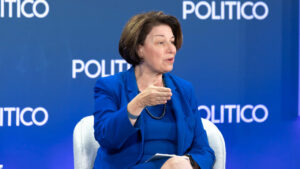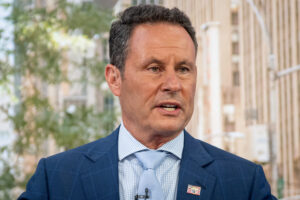Congress
FBI chief, under fire, tells senators to ‘bring it on’
Embattled FBI director Kash Patel defended his leadership of the nation’s top law enforcement agency in opening remarks Tuesday morning before the Senate Judiciary Committee.
“I’m honored to be the ninth director of the FBI — I’m not going anywhere,” he told lawmakers. “If you want to criticize my 16 years of service, please bring it on.”
It could set the tone for the Judiciary panel’s annual oversight hearing of the FBI, which comes amid increased scrutiny of Patel in the aftermath of last week’s assassination of conservative political commentator Charlie Kirk.
In the wake of the killing, Patel posted on social media that the government had a suspect in custody — only to post shortly thereafter that the suspect, who was not the killer, had been released. Patel defended the bureau’s handling of the investigation in his opening statement, while Sen. Judiciary Chair Chuck Grassley opened the proceedings by noting the FBI director would have to answer for the department’s handling of the situation.
Patel, in his remarks, also criticized the Justice Department’s handling of the sex crimes case against Jeffrey Epstein in the George W. Bush administration, including calling out former U.S. attorney Alex Acosta, who oversaw Epstein’s controversial plea deal. Acosta later served as Labor Secretary in the first Trump administration but resigned in the midst of criticism of his handling of the Epstein deal. He is scheduled to be interviewed by the House Oversight and Government Reform Committee on Friday as part of its Epstein probe.
In his own opening statement, Sen. Dick Durbin, the committee’s top Democrat, previewed what questions could look like from his side of the aisle: He took aim at the recent firings at the FBI, Patel’s background as a Trump loyalist and the current administration’s approach to the Epstein case.
Anticipating that the recent surge in political violence will be a theme at the Tuesday hearing, Durbin also argued that both sides bore a responsibility for turning down the temperature in partisan rhetoric: Democrats were not to blame for Kirk’s assassination, he said, nor were Republicans responsible for the murder of Minnesota House Speaker Melissa Hortman back in June.
Senators will each be allotted ten minutes to question Patel, who is appearing before lawmakers on Capitol Hill for the first time since his confirmation. He’ll testify Wednesday in front of the House Judiciary Committee for its own FBI oversight hearing.
Congress
House to vote on resolution honoring Charlie Kirk
House GOP leaders are teeing up a vote later this week on a measure honoring assassinated conservative activist Charlie Kirk.
The resolution is titled “Honoring the life and legacy of Charles ‘Charlie’ James Kirk” and condemns his killing as a “heinous act of violence” and a “sobering reminder of the growing threat posed by political extremism and hatred in our society.” It says “acts of politically motivated violence are antithetical to the principles of a free republic,” in a sentiment that is likely to find wide bipartisan support.
It also praises Kirk as someone whose “steadfast dedication to the Constitution, civil discourse, and Biblical truth inspired a generation to cherish and defend the blessings of liberty,” something that could generate some Democratic grumbling. The resolution follows a Monday vigil organized by Republican leaders in the Capitol’s Statuary Hall.
The House Rules Committee will meet Tuesday afternoon on the Kirk resolution and the recently unveiled seven-week stopgap funding measure. GOP leaders want to vote on both pieces of legislation by Friday.
Congress
House Republicans roll out 7-week funding patch as shutdown looms
House GOP leaders released text Tuesday afternoon of a stopgap funding bill that would provide tens of millions of dollars in security assistance for lawmakers and other federal officials amid growing concern about political violence.
The 91-page measure would head off a government shutdown on Oct. 1 and keep federal agencies funded through Nov. 21, as well as provide $30 million for lawmaker security and a total of $58 million in security assistance the White House requested for the Supreme Court and executive branch. While GOP leaders plan to call a floor vote later this week, it’s still unclear whether Democrats will vote in support of the bill, with President Donald Trump calling on congressional Republicans to stiff-arm the minority party in government funding negotiations.
Some House conservatives voiced opposition to the funding patch even before GOP leaders unveiled it, including Rep. Thomas Massie of Kentucky, a frequent “no” vote. But House GOP leaders believe they have the votes to push the measure through the House by Friday and jam Senate Democrats, even if no House Democrats vote in support.
“They have chosen not to engage Democrats,” California Rep. Pete Aguilar, the House Democratic Caucus chair, said Tuesday. “So my assumption is that they have the plan, and they have something that has the votes.”
If the House does succeed in passing the spending patch later this week, it will pressure Senate Minority Leader Chuck Schumer to hone his demands ahead of the shutdown deadline, since votes of Democrats are needed in the Senate to clear the 60-vote filibuster threshold.
“Our Republican colleagues can say whatever they want. But it is clear as could be that they want a shutdown,” Schumer said on the Senate floor Tuesday morning. “Their actions show they clearly want to shut things down because they don’t want to negotiate with Democrats.”
Republicans note that Schumer has yet to publicly define policy or funding ultimatums ahead of the shutdown deadline, however, as he and House Minority Leader Hakeem Jeffries stick to broad criticism of Republican cuts to health care.
“House is gonna do what the House is gonna do,” Sen. John Kennedy (R-La.) said about GOP leaders moving ahead with a stopgap funding patch.
“Sen. Schumer continues to just talk in concepts and platitudes. And until he puts something on the table, there’s nothing to do,” he added.
The funding in the bill to heighten security for congressional lawmakers, including when back home in their districts, comes in the wake of the assassination of conservative activist Charlie Kirk. The additional $30 million would boost a longstanding program allowing members of Congress to request security through partnerships between the Capitol Police and state and local law enforcement agencies, which has seen a surge of interest from lawmakers. The funding is available to both the House and Senate.
“What we have seen is a broad uptick over the course of the past year of members utilizing the programs,” House Administration Chair Bryan Steil (R-Wis.) told reporters Tuesday morning.
A separate pilot program allowing members to hire private security is slated to end later this month, Steil said, but added that House leaders “can always look at reappropriating currently available funds” to continue it.
The $58 million in emergency funding for extra Supreme Court and executive branch security comes as the White House cites a surge in threats against justices and other public officials in the aftermath of Kirk’s killing.
Fulfilling another White House request, the bill allows the Trump administration to spend whatever funding is necessarily on the WIC nutrition program that serves low-income pregnant women, infants and children. Without that funding leeway, states wouldn’t be able to provide assistance to everyone who is eligible, the White House warns.
The measure also includes the so-called “D.C. fix” which would allow the capital city’s government to spend its full budget, which is mostly funded through locally raised funds, through September 2026. Congress blocked that authority in mid-March by leaving out routine language in the stopgap passed in the spring, blowing a roughly $1 billion hole in the city budget.
The measure introduced Tuesday does not include any of the health care proposals that have been percolating on Capitol Hill, such as extending enhanced tax credits for health insurance under the Affordable Care Act. Low- and middle-income Americans who rely on the program will start to receive notices about higher premiums in the coming weeks, and health insurers will soon lock in pricing. But GOP leaders want to punt the fight, which is deeply divisive within their ranks, to later in the year.
“We have until the end of December to figure all that out,” Speaker Mike Johnson said Tuesday morning.
Nicholas Wu contributed to this report.
Congress
Thune mocks Schumer’s shutdown stance: He ‘knows where my office is’
Senate Majority Leader John Thune responded tartly to his Democratic counterpart’s calls for “bipartisan negotiations” ahead of an approaching government shutdown deadline Tuesday, underscoring the posturing that has marked the process thus far.
Minority Leader Chuck Schumer “knows where my office is,” Thune told reporters. “Why do you guys keep asking me this?” He later added during a floor speech that Schumer “knows my number. I haven’t heard from him.”
It’s a direct retort to Schumer’s repeated calls for a “negotiation” ahead of the Sept. 30 funding deadline. Schumer and House Minority Leader Hakeem Jeffries have sent letters to Thune and Speaker Mike Johnson requesting a bipartisan meeting but haven’t gotten a response.
Thune told reporters he was “happy” to meet with Schumer though he questioned the “reason” for a meeting since Republicans are planning to proceed with a “clean” short-term stopgap bill that would largely maintain current government funding levels into late November without major policy add-ons.
Still, it’s the first time since March that Thune has acknowledged a willingness to meet with Schumer on funding.
Democrats have warned that if Republicans do not include them in negotiations about funding the government that they will bear the blame for a shutdown come Oct. 1. Trump indicated in a Fox News interview last week that he believed Republicans didn’t need Democratic votes, but in the Senate it will take at least seven of them to help advance a stopgap.
“When he says out loud that he says he doesn’t need or want our votes, that means Donald Trump wants a shutdown,” Schumer said Tuesday, adding that Thune and Johnson are “doing exactly what Donald Trump wants.”
“They have refused even to sit down at the table … despite repeated requests,” Schumer added.
Schumer, in particular, is under pressure to stand up to Republicans after agreeing to advance a GOP-written continuing resolution back in March. GOP leaders are eager to run the same play again this month and test his resolve.
Inside a House GOP conference meeting Monday, influential conservative Rep. Jim Jordan (R-Ohio) stood up to back the clean-CR plan, reminding his colleagues of Schumer’s recent comments opposing it.
So “send Chuck Schumer a clean CR,” Johnson told them.
Schumer hasn’t outlined a specific policy proposal that Democrats need to see attached to any stopgap in exchange for their votes, but he has said in general terms that health care needs to be addressed. Democrats have made expiring Affordable Care Act health insurance subsidies a key area of focus.
Thune, however, reiterated Tuesday that the subsidies, which lapse Jan. 1, won’t be attached to the stopgap bill and that there’s “nothing close to ready to go” that could be finished by the end-of-the-month deadline.
“I think the ACA subsidies will be an issue that will be addressed, but I think right now we’ve got to keep the government open so we can do appropriations bills,” Thune said, adding that he believes there’s a “path” to keeping the government open and having a conversation on the subsidies.
Speaker Mike Johnson told reporters much the same Tuesday, saying “there are some Democrats pining for a shutdown” and that there was “zero chance” that Republicans would heed another emerging Democratic demand: unwinding the Medicaid cuts included in the GOP megabill passed this summer.
Schumer indirectly responded to Republicans wanting to punt the discussion of an ACA subsidies extension, saying at a health care event Tuesday that “we don’t put any faith” in the GOP’s willingness to deal with the issue later.
-
Uncategorized10 months ago
Bob Good to step down as Freedom Caucus chair this week
-

 The Josh Fourrier Show10 months ago
The Josh Fourrier Show10 months agoDOOMSDAY: Trump won, now what?
-

 Politics7 months ago
Politics7 months agoFormer ‘Squad’ members launching ‘Bowman and Bush’ YouTube show
-

 Politics10 months ago
Politics10 months agoWhat 7 political experts will be watching at Tuesday’s debate
-

 The Dictatorship7 months ago
The Dictatorship7 months agoPete Hegseth’s tenure at the Pentagon goes from bad to worse
-

 Politics10 months ago
Politics10 months agoHow Republicans could foil Harris’ Supreme Court plans if she’s elected
-

 The Dictatorship7 months ago
The Dictatorship7 months agoLuigi Mangione acknowledges public support in first official statement since arrest
-
Economy10 months ago
Fed moves to protect weakening job market with bold rate cut







